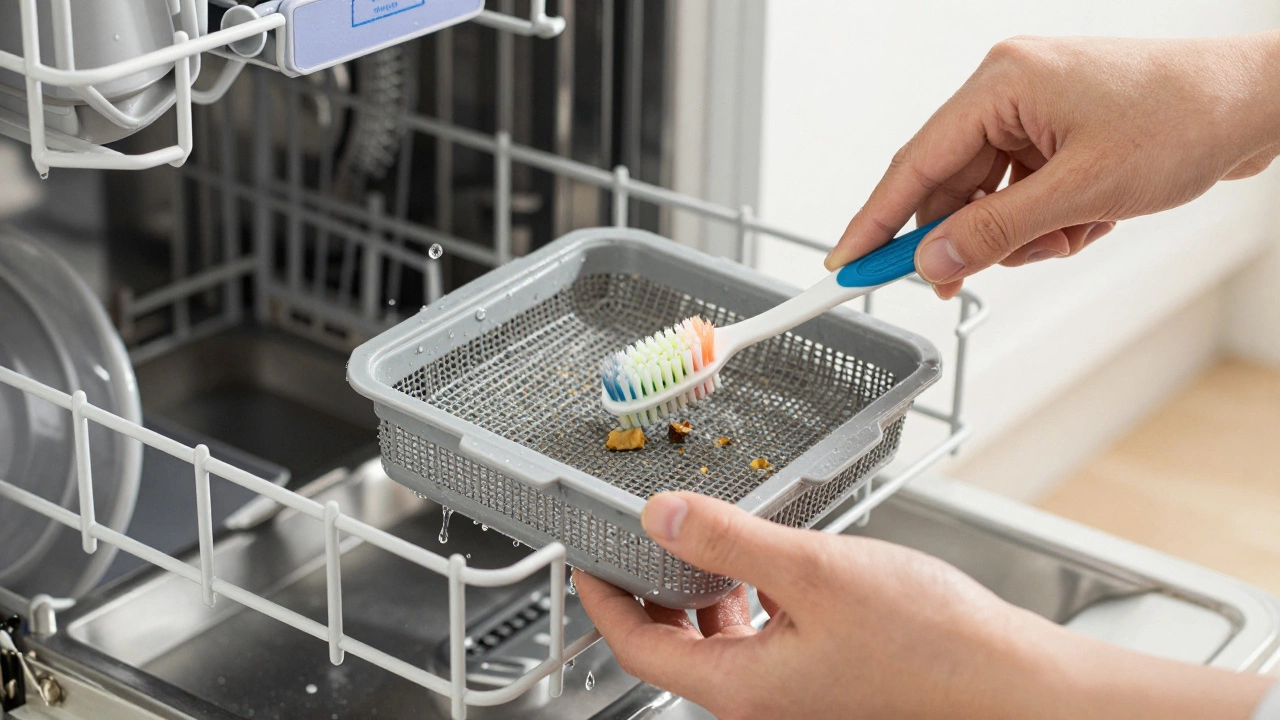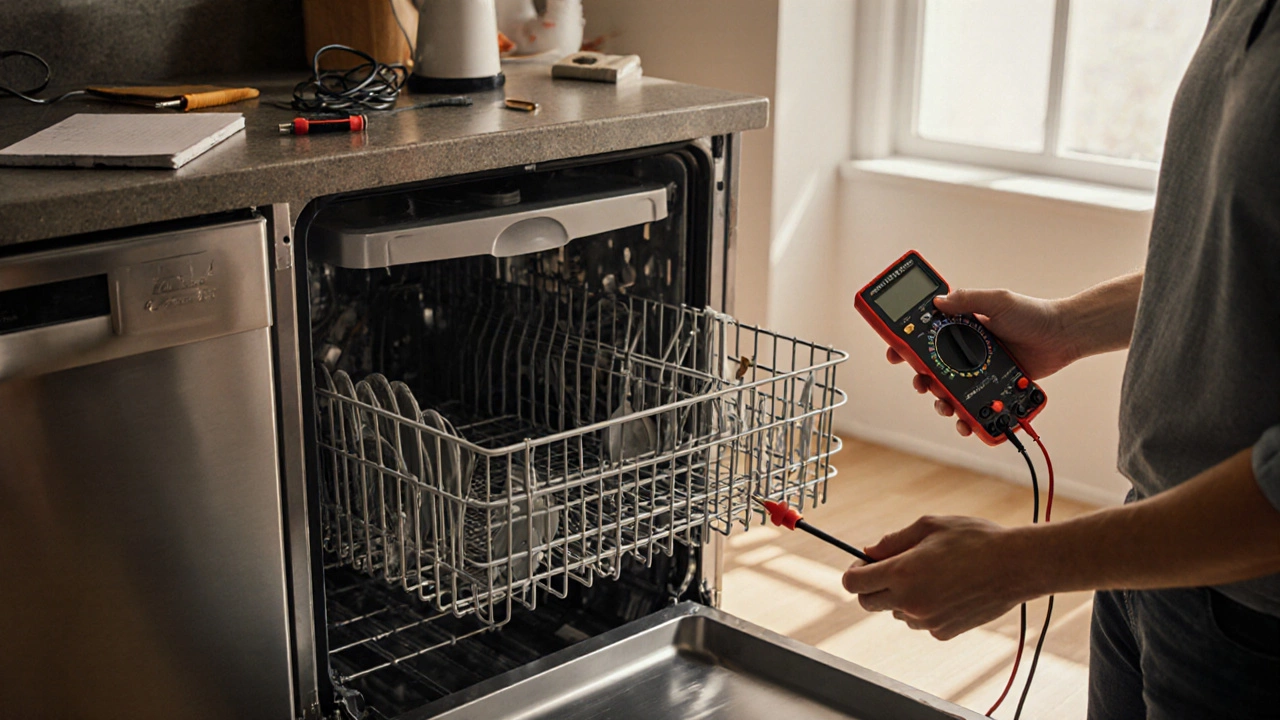
- 14 May 2025
- Gideon Thornton
- 0
Ever wondered if your dishwasher is on borrowed time, or if you can squeeze a few more years out of it? Figuring out what counts as a “good” lifespan isn't as simple as just looking at the purchase date. Brands toss around different numbers, but in a typical kitchen, a dishwasher hangs in there for about 8 to 12 years. Some go kaput at 6, while others just keep humming along past 15, especially with a little TLC.
It’s not just about luck—what you do (or don’t do) makes a huge difference. Skipping regular cleaning, overloading it, or using cheap detergent can shave years off your machine. On the flip side, a bit of attention helps your dishwasher last way closer to that upper range. Most repairs pop up around year seven, so that’s usually when folks start to decide between fixing or replacing. Want to know the smart moves for getting every last rinse out of your machine? Let's break it down step by step.
- How Long Dishwashers Usually Last
- What Shortens or Extends Dishwasher Life
- Signs Your Dishwasher Is Near the End
- When Is It Worth Repairing?
- How to Make Your Dishwasher Last Longer
- Comparing New Dishwashers to Older Models
How Long Dishwashers Usually Last
If you’ve ever heard someone say their dishwasher “just died out of nowhere,” they probably missed the warning signs. On average, a dishwasher gives you about 9 to 12 years before peace and quiet returns to your kitchen. Consumer Reports, who’s been testing appliances forever, says,
"Most dishwashers will function well for about 10 years before the chance of a major failure jumps way up."
Of course, there are a few outliers. If you grab a no-frills model or run wash after wash every day, don’t count on hitting the 12-year mark. Built-in dishwashers—the kind most people have—are designed to last longer than portable types. Still, even the best ones won’t live forever, especially if you skip basic upkeep.
Here’s a quick look at life expectancy by brand (real numbers from appliance repair surveys and user reports):
| Brand | Average Lifespan (Years) |
|---|---|
| Bosch | 10-13 |
| Whirlpool | 9-12 |
| GE | 8-10 |
| Samsung | 7-10 |
| KitchenAid | 10-12 |
Real-life use matters a lot. Someone running a small load twice a week with proper detergent stretches that dishwasher lifespan. A busy family using it twice a day, not so much. And if you live in an area with hard water, you can expect more mineral buildup and a shorter life (unless you’re on top of cleaning that filter and adding rinse aid).
Bottom line? If yours is past its 10th birthday and starting to sound like it’s grinding gravel, that’s normal. It doesn’t mean you have to toss it tomorrow, but be ready for more frequent repairs or a replacement within the next couple years.
What Shortens or Extends Dishwasher Life
The way you treat your dishwasher can make or break how long it sticks around. If you ever wondered why your neighbor’s dishwasher lasted 15 years while yours coughed up at 8, it probably comes down to little habits and choices.
Hard water is a big enemy here. Minerals from hard water build up on the inside and mess with components, especially heating elements and spray arms. Over time, that gunk means more breakdowns and an early trip to the junkyard. Using a quality water softener or the right kind of detergent can make a noticeable difference.
How often do you use your dishwasher? Machines that run daily wear out faster than those used a couple of times per week. Every cycle puts stress on motors and seals, so think of loads like mileage on a car.
Skipping regular cleaning is another silent killer. Filters clogged with food scraps force your machine to work harder and can actually start causing stink and mold. Even just giving the filter a rinse once a month saves you future headaches.
- Don’t overload it. Cramming stuff in blocks spray arms and forces the motor to struggle.
- Use the recommended detergent and right cycle for the load.
- Wipe down door seals. This keeps them from getting brittle and leaky.
- Check for leaks and fix them ASAP so water doesn’t fry electrical bits underneath.
Here are a few quick stats showing what affects your dishwasher lifespan the most:
| Factor | Impact on Lifespan |
|---|---|
| Hard Water | Lowers by 2–4 years if untreated |
| Overloading | Lowers by 1–2 years |
| Monthly Filter Cleaning | Adds up to 2 years |
| Regular Professional Maintenance | Adds 1–3 years |
| Daily Usage vs. Weekly | Daily: -2 years, Weekly: baseline |
Treat your machine right, and it’ll reward you—usually with years of extra, trouble-free use.
Signs Your Dishwasher Is Near the End
You don’t need to be a repair expert to spot when your dishwasher is ready to call it quits. The warning signs actually show up way before it refuses to turn on at all. If your loads aren’t clean or the machine makes weird noises, that’s your first tip-off. But let’s get more specific so you’re not left guessing.
- Dirty dishes after every cycle: If you’re finding bits of food or spots even after the hottest wash, and you’ve checked the filter, your dishwasher could be struggling for good.
- Weird loud noises: Grinding, banging, or buzzing? Motors and pumps are wearing out. If the noise has changed recently, that’s rarely a good sign.
- Water pooling on the floor: Leaks mean bad seals, faulty pumps, or cracks in the tub. Even a small puddle is a big red flag.
- Door doesn’t latch or seal: If the door feels loose or water is escaping, the latch and gasket might be shot. Sometimes a cheap fix, sometimes not.
- Rust inside the tub: A few spots can lead to rusty water or trouble with moving parts. Rust isn’t just ugly; it usually means bigger problems are coming.
- It takes forever to finish a cycle: Old dishwashers have a tendency to run longer and longer as they work harder to get things clean. Sometimes, they never finish the cycle at all.
- Strange smells that won't go away: A lingering, rotten odor means gunk is deep in the pipes or pump, and even a deep clean might not cure it if the machine is aging out.
Here's a breakdown of common issues and how often they show up in worn-out dishwashers, based on recent appliance repair data:
| Problem | % of Failing Dishwashers (after 8+ years use) |
|---|---|
| Not cleaning properly | 47% |
| Weird noises | 41% |
| Water leaks | 30% |
| Trouble starting or finishing cycles | 35% |
| Rust or physical damage | 19% |
If you’re noticing two or more of these problems, chances are your dishwasher lifespan is running out. While you might patch things up, don’t be surprised if more issues pop up soon after. Sometimes, it’s better to move on and invest in a new machine rather than pour money into constant repairs.

When Is It Worth Repairing?
Before you grab your toolbox or call in a pro, take a minute to think about how old your dishwasher actually is. If it's under 7 years old, repairs usually make sense—unless you’re facing a total meltdown like a busted motor or a dead control board. Those repairs often cost so much, it feels like pouring money into a sinking ship. For machines over 10 years, most people skip repairs and look for a replacement, especially if the fix costs more than half the price of a new machine.
Here's a simple chart to help you compare:
| Dishwasher Age | Repair Cost vs. New | Usually Repair? |
|---|---|---|
| 0-5 years | < 50% of new price | Yes |
| 6-9 years | < 40% of new price | It depends |
| 10+ years | Any cost | Usually no |
Some repairs are just simple fixes, like a broken door latch or a faulty hose, and can be done for under a hundred bucks. But once you’re looking at major stuff—like new pumps, circuit boards, or extensive water damage—you start getting close to the price of a brand-new dishwasher lifespan. Extra tip: most dishwashers' warranties last 1-3 years for basic parts, though some pricier brands stretch it to five, but big repairs outside warranty rarely pay off.
If your dishwasher still gets dishes clean, drains well, and isn’t leaking or making scary noises, a repair is usually a win. But leaks under the tub, repeated electronic glitches, or rust? That’s when it starts making sense to call it quits. One last thing—check if there’s a rebate on trading in old appliances; sometimes you get a small bonus for upgrading sooner rather than later.
- If your machine is still under warranty, always check with the manufacturer first—no need to pay out of pocket if you don’t have to.
- For common repairs (like stuck spray arms or clogged filters), a local handyman can often fix it fast and cheap.
- When faced with big repairs on anything old, put your money towards a new, energy-efficient model that’ll save you more long-term.
How to Make Your Dishwasher Last Longer
If you want your dishwasher to last past that average 10-year mark, you need more than luck. The secret? Take a few simple steps to avoid the breakdowns that send folks running to buy a new one every few years. Here’s what actually works, according to appliance repair pros and real-world users.
- Dishwasher lifespan hinges on keeping the filter and spray arms clean. Gunk gets stuck fast—check your filter every month. A clogged filter makes the machine work harder and can burn out the pump.
- Run hot water at your sink right before starting the dishwasher. This gives your machine a head start with hot water, helping detergent dissolve and work better.
- Don’t overload it. If water can’t reach every dish, stuff stays dirty and your dishwasher strains to finish the job. Two loads are better than one big jammed mess.
- Use the right detergent—not too much, not too little. Powders and pods generally don’t leave as much gunk in the machine as liquids.
- Check the door seal for debris. Wipe the seal with a damp cloth every couple weeks. If food, pet hair, or gunk builds up, it can mess with the seal and cause leaks.
- Every few months, run a cleaning cycle with a dishwasher cleaner. These are made to get rid of mineral deposits and grease stuck inside. Skip the vinegar trick unless you know your machine can handle it, as acid can damage some rubbers and plastics.
- Fix the little things early, like weird noises, draining slow, or an error light. Small problems get expensive if you just hope they’ll go away.
This stuff isn’t just theory. The National Association of Home Builders looked at hundreds of machines, and owners who followed these habits saw their units last about four years longer on average.
| Best Practice | Extra Years Gained |
|---|---|
| Monthly filter clean | +1.5 years |
| Proper loading | +1 year |
| Regular descaling | +1 year |
| Wiping seals | +0.5 years |
Think of it this way: a few extra minutes a month saves you the hassle and cost of dealing with a dying machine. Your wallet—and your dishes—will thank you.
Comparing New Dishwashers to Older Models
Here’s where things get interesting. If you talk to anyone who bought a dishwasher in the early 2000s, they’ll probably tell you, “They just don’t make ‘em like they used to.” There’s some truth to it. Older machines were built heavier, with more metal parts, and a lot less electronics that could freak out. It wasn’t unusual to see a model last 15 or even 20 years with basic maintenance.
Jump to newer dishwashers and things are a little different. Today’s machines are all about saving you water and electricity. They usually run quieter and have more cycling options. Downside? More tech means more stuff that can break—a new dishwasher is often packed with sensors, touchscreens, and “smart” features. This can help with efficiency, but it also means a small broken part could put the whole thing out of action. A Consumer Reports survey found the average lifespan is now 9-10 years, a drop from older models.
Check out this quick comparison:
| Feature | Older Models (before 2010) | New Models (2015+) |
|---|---|---|
| Average Lifespan | 12-15 years | 9-10 years |
| Energy Use | Up to 6 gallons/wash | As low as 3 gallons/wash |
| Noise Level | Louder (50+ dB) | Quieter (40-48 dB) |
| Repair Frequency | Low (mostly mechanical fixes) | Medium (electronics, sensors often fail) |
One thing to keep in mind: new machines do save you a decent chunk on utility bills, and they’re better for the environment. But you’re probably not getting two decades out of them. Brands have started to shift toward more plastic parts and circuit boards, so if you get 10 years, you’re doing great.
Here are a few tips if you’re deciding between repairing an old workhorse or springing for a new one:
- If yours is still getting the job done after a decade, consider just replacing worn-out bits like racks or spray arms.
- For units with recurring control board or sensor issues, updating to a new dishwasher makes sense long-term.
- New dishwashers come with better warranties—often covering that key dishwasher lifespan for the first couple years.
Bottom line: newer dishwashers win on efficiency and features, but older ones often outlast them in pure longevity. Your next purchase might save you money on each wash, but don’t expect it to stick around forever.



